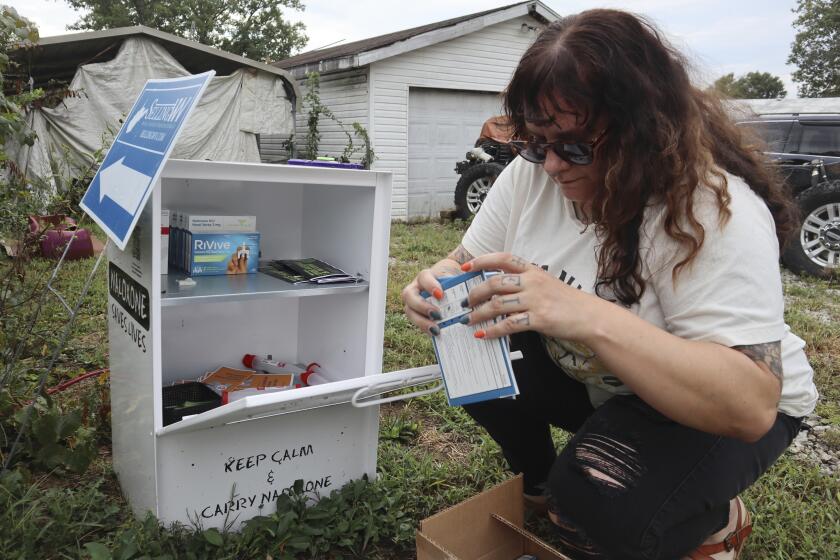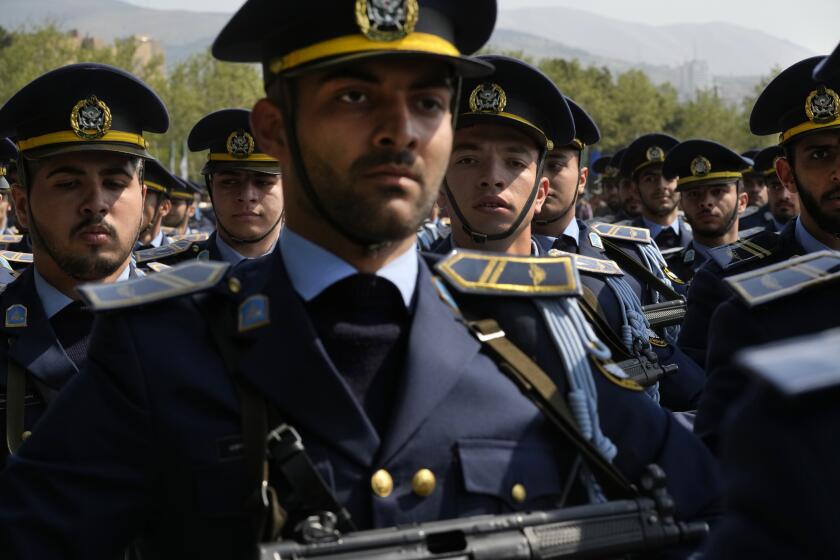Clinton, U.N. Chief Confer on Bosnia Airdrop
President Clinton met Tuesday with U.N. Secretary General Boutros Boutros-Ghali as the Administration prepared final plans for a limited, largely symbolic, airdrop of food and medicine to besieged villages in eastern Bosnia-Herzegovina.
Under plans being worked out with U.S. allies, and likely to be made final later this week, American cargo planes, flying far above ground to reduce their vulnerability to antiaircraft fire, will begin dropping supplies as early as next week to as many as 100,000 people in villages controlled by each of the three warring parties in the Bosnian civil war--Muslims, Serbs and Croats.
No combat escorts will accompany the supply planes, and no American ground forces will be involved, officials said.
The “judgment of our military experts” is that the operation will be a relatively low-risk affair, said a senior American official, speaking to reporters after the meeting between the President and Boutros-Ghali. “We do not believe that air cover would be needed, and we do not contemplate” any use of combat planes, the official said.
The decision to include airdrops to Serbian villages and to avoid using combat escorts is in part designed to forestall Serbian retaliation against the airlift, U.S. officials said.
But the move is also a concession to logistic realities: Given the height at which the planes will fly, U.S. pilots will have limited control over which villages the cargoes land near.
Despite bellicose statements by some Serbian leaders, who have said the drops could spark wider conflict, private assurances from the Serbs to American officials have been “satisfactory,” the official said.
Asked before the meeting with Boutros-Ghali if he thought the mission might lead to wider fighting, Clinton said he did not. “What we’re discussing is very different, has no combat connotations whatever and it’s purely humanitarian and quite limited,” he said.
Administration and U.N. officials stressed that the airdrops will supplement ground convoys that have been carrying supplies to the Bosnian capital of Sarajevo and other parts of the country.
“Obviously, the most effective way to supply is on the ground,” the senior U.S. official said. “But we believe it would be effective enough to make a difference to people who are at great risk.”
Administration planners hope the demonstration of American resolve will persuade the fighters on all sides to stop blocking ground convoys of supplies.
The U.N. high commissioner for refugees, who handles relief efforts in Bosnia, temporarily suspended ground convoys last week because Serbian forces stopped several convoys from reaching Muslim strongholds. The commissioner also halted an airlift to Sarajevo after the Muslim-dominated Bosnian government declared a boycott of aid in solidarity with residents of eastern Bosnian enclaves cut off from ground shipments.
Already, as the United States publicly discussed the air relief operation, ground convoys to Sarajevo have resumed, the U.S. official noted. Tuesday, for example, Serbian commanders allowed a U.N. relief convoy to proceed to Tuzla, a Bosnian government stronghold in the northeastern part of the country. “We think we have contributed” to that, the U.S. official said.
The official conceded that the mission is in part symbolic but disputed contentions that the airdrops will be of little practical consequence, calling that characterization “unfair.”
Clinton will not make a final announcement of the new policy until American diplomats finish consultations with allied governments. American envoys so far have not turned up any other governments interested in participating, but the senior U.S. officials said the Administration is prepared to go it alone.
Boutros-Ghali indicated that the United Nations would have no objection to that. “We completely agree. There is no problem,” he said after the meeting with Clinton.
The Administration, however, may still face difficulties with its allies. French officials have been wary of the airdrops for fear of Serbian retaliation against French peacekeeping troops in the area. And on Tuesday, British Foreign Secretary Douglas Hurd declared in Parliament that the British government had no intention of participating in the airlift.
“We do not have the intention of using (British) planes for this particular exercise by air, although we welcome the decision of the Americans to do so,” Hurd said.
Britain has 2,600 troops in Bosnia whose mission is to escort U.N. relief convoys through disputed territory. Clinton and British Prime Minister John Major are expected to discuss the issue when they meet today in Washington.
Pentagon officials said the drops will be made by Air Force C-130 Hercules cargo planes, each carrying as many as 16 one-ton pallets of foodstuffs and water; the planes will drop supplies from altitudes of 5,000 to 10,000 feet to try to avoid antiaircraft fire.
One problem with high-altitude efforts is that flying at 5,000 feet or higher severely impairs the operations’ accuracy, possibly endangering civilians, who can be hit by parachuted pallets. High-altitude drops caused considerable injuries as well as fatalities in 1991 when American planes dropped supplies to Kurdish refugees who had fled from Iraq into eastern Turkey.
But at the same time, Administration officials are wary that flying any lower could seriously increase the risk of casualties, in terms of both the number of air crews likely to be shot down and the possibility that some might be taken prisoner. Lower-altitude flights would have required fighter cover, which in turn might have provoked the Serbs into retaliation, U.S. officials feared.
Tuesday, for example, the deputy commander of the Bosnian Serb army warned that using combat planes in any resupply operation would spark wider fighting.
“The use of aircraft escorted by combat planes for the delivery of humanitarian aid to Muslims would represent the most dangerous point on the road,” Gen. Milan Gvero told the Belgrade news agency Tanjug.
U.S. officials said the C-130s could be protected by fighters from the aircraft carrier John F. Kennedy, which would be stationed offshore during the operation--although they insisted they did not believe such strikes would be necessary.
Pentagon spokesman Robert Hall said Tuesday that the United States would publicly warn Serbian troops against attacks on U.S. aircraft well before it launched any airdrop operations and would be ready to protect the American cargo planes if it became necessary. The United States now has 20 warships in the Mediterranean area that could be used to back up American airlift.
Times staff writers William Tuohy in London and Art Pine and Stanley Meisler in Washington and Times special correspondent Laura Silber in Belgrade contributed to this report.
More to Read
Sign up for Essential California
The most important California stories and recommendations in your inbox every morning.
You may occasionally receive promotional content from the Los Angeles Times.











